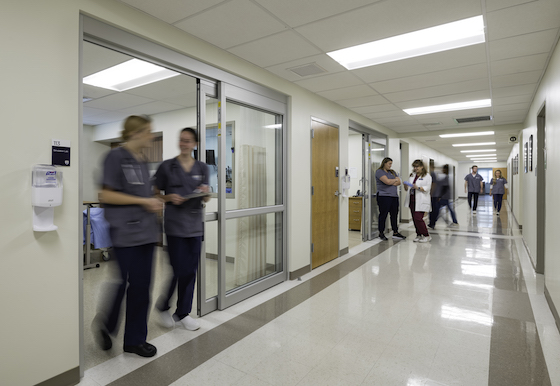Establishing The Ruth Whitaker Holmes School of Behavioral and Health Sciences

Part seven of the feature story in Hood Magazine fall 2023.
Forging the Future: The Campaign for Hood College
Program
- Nursing (BSN)
- Counseling, Clinical Mental Health (M.S.)
- Nutrition Science (M.S.), Nutrition Science Track
- Social Work (B.A.)
- Public Health (B.A.)
Department
- Nursing
- Psychology & Counseling
- Sociology & Social Work
One of the boldest initiatives of the campaign was founding an entirely new school—The Ruth Whitaker Holmes School of Behavioral and Health Sciences. Undergraduate programs in nursing, psychology, public health, social work and sociology as well as graduate programs in counseling and nutrition science are now housed under one roof. Campaign donors have also paved the way for the recently approved Master of Science in Nursing (MSN) and Doctor of Nursing Practice (DNP).
“Grouping the behavioral and health sciences programs together allows for greater collaboration between disciplines, which leads to more opportunities for our students,” says Megan Shaine, Ph.D., clinical mental health counseling program director. “This kind of teamwork mimics the real world, where integrated healthcare is increasingly desirable.”
Founded in 2022, the school was made possible thanks to a major gift of $2.5 million from Hood alumna Ruth Whitaker Holmes ’55, H’93, Ph.D., and her husband G. Burtt Holmes, O.D. The Maryland Department of Commerce E-Nnovation Initiative Fund and additional benefactors then matched the Holmes’ gift with grants and gifts totaling $6.8 million. Another lead gift of $250,000 from Edith Howard Hogan ’59, P’86, jumpstarted the nutrition science M.S. program, while the Maryland Higher Education Commission, Kahlert Foundation and Maryland Clinical Resources Consortium contributed grants toward the nursing program.
Frederick Health, the region’s largest healthcare system and close partner of the College, has also been instrumental in the school’s launch by providing a site directly adjacent to Hood’s campus. Newly renovated, the Toll House Avenue building has been outfitted with state-of-the-art simulation labs, where nursing and counseling students practice procedures on mock patients under observation from faculty.
The wider Frederick community will also benefit from the NeighborHood Counseling Training Center, which offers mental health services on an income-adjusted fee basis. The center is staffed by counseling students, allowing them to gain experience working with actual patients.
“Anyone who has tried to find a counselor or therapist lately can tell you that it’s not easy and can be quite expensive,” says Shaine. “We offer accessible mental health services from well-trained, advanced counseling students, who are under the supervision of multiple licensed faculty and staff members.”
The Frederick Health-Hood College partnership extends even further, as students are able to complete fieldwork placements at a variety of Frederick Health locations, including hospitals, primary care practices and clinics throughout the county. Plus, these programs now have room to grow. Nursing, for instance, has seen the fastest increase in enrollment of any undergraduate program at Hood, starting with 23 students and now expecting more than 200.
“The partnership is a two-way street,” says Jennifer Cooper, DNP, RN, chair of the nursing department. “We can prepare students, but we need our community partners to aid us in providing high-impact educational experiences to make students passionate about the career they are entering.”
As industry-wide workforce shortages have plagued healthcare systems, the School of Behavioral and Health Sciences aims to address the urgent need for medical professionals. While training healthcare workers is critical, retaining them is of equal importance to meet the needs of both employers like Frederick Health and the people they serve.
“Our students are immersed in experiences that help those in our community impacted by violence, addiction, chronic health problems and terminal illness,” says Cooper. “Students may enter Hood know- ing that they want to be a nurse, public health professional, counselor, social worker or dietitian, but it is the high-impact experiences that affirm passion and drive them to be good at what they do.”
Read the full issue of Hood Magazine here.
Are you ready to say Hello?
Choose a Pathway
Information will vary based on program level. Select a path to find the information you're looking for!
